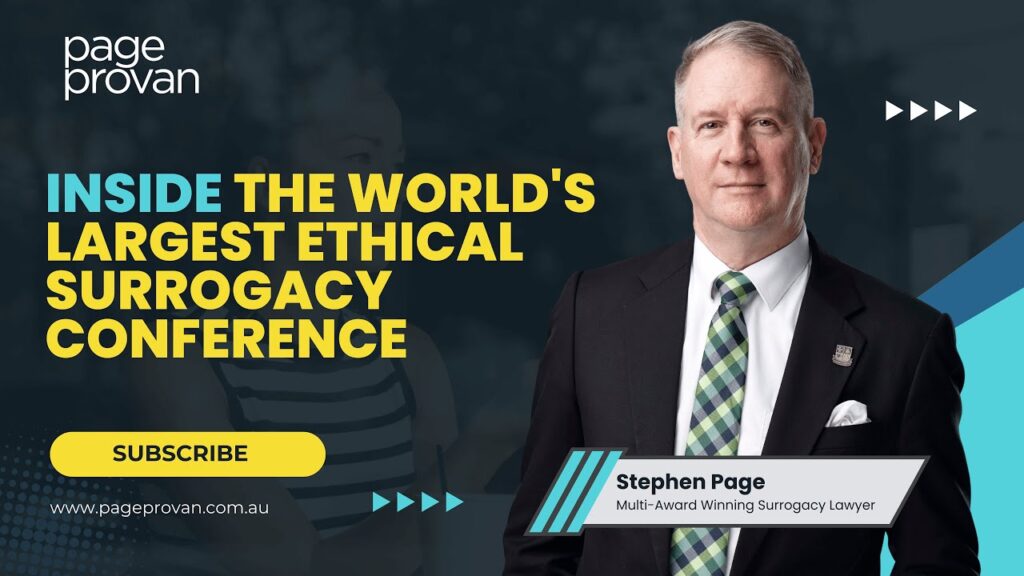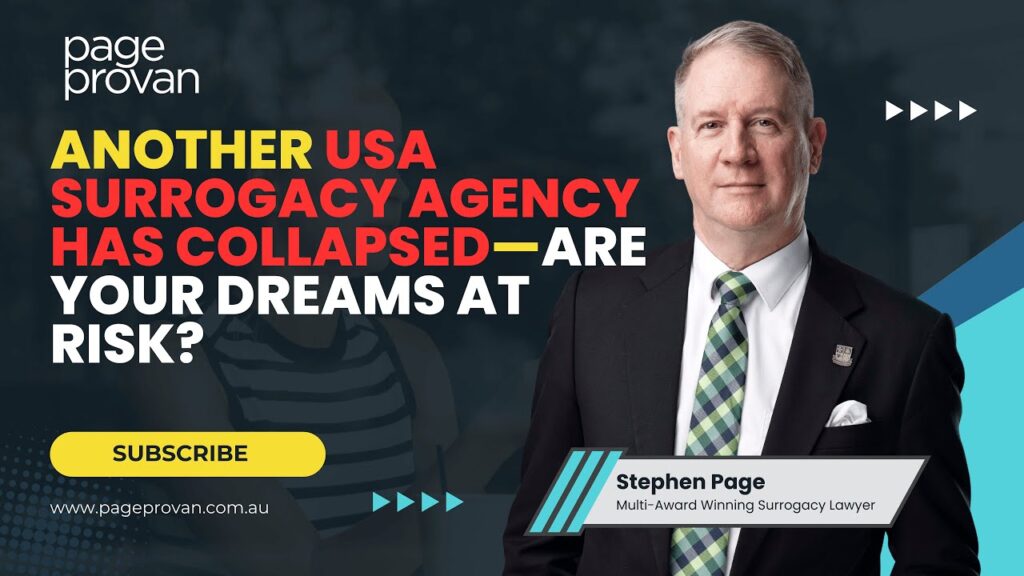Surrogacy law changes proposed in the ACT
In this video, Page Provan Director and award-winning surrogacy lawyer Stephen Page, talks about the proposed changes in the ACT surrogacy law.
Transcript
G’day, I’m Stephen Page from Page Provan Family and Fertility Lawyers and today I’m talking about proposed surrogacy law changes in the ACT. This video has been recorded in December 2023 and you may say, well, why would I put the date in?
I put it in because we’re talking about our moving feast. In October, if I recall correctly, or it might be early November, a bill was put before the Legislative Assembly in the ACT to amend the Parentage Act 2004, that’s the ACT legislation that covers surrogacy.
Now, the ACT government was talking about changing the surrogacy laws, and it wrote to a number of stakeholders asking for submissions. They were looking at really, I think, incremental changes.
But somehow, I saw this and I wrote a submission, and I’m afraid to say my submission, as one IVF doctor said to me, was a book, 66 pages and this is on my website.
You can have a look at this submission on my website. But as a result of that, following that submission process, the ACT government prepared a bill, and that bills before the legislative assembly and in early November, a decision was made by the legislative assembly to send it off to committee.
So the committee is now undertaking inquiry, the time for submissions has closed, and the committee is to deliver a report from recollection at the end of January. So it may be January or February when it releases its report. So we’ll see what it says.
But what does the bill say? Well, the ACT legislation about surrogacy is a bit creaky. The ACT, like Queensland and New South Wales, criminalises commercial surrogacy and overseas, there’s no proposed change to that.
Except, if you’ve already had your child overseas through commercial surrogacy, you may be able to go to the Supreme Court of the ACT and get an order recognising you as the parents. This is hopefully an easier process than having to do a step-parent adoption, and you can have a look at my video about step-parent adoption.
But, a writer with that requirement is that the legislation does not prevent or wipe away any criminality that may have occurred by engaging in commercial surrogacy overseas, this seems pretty counterintuitive.
No person in their right mind will go off to the Supreme Court to say, I want to get an order so that I’m now recognised as a parent, when to do so might result in the Supreme Court of the ACT Judge, referring you to police for prosecution.
Because the ACT, unlike Queensland or New South Wales, has no timeline for prosecution of this offence, it’s just nuts, you wouldn’t go there. It’s like going to the Family Court saying to the family court judge, Oh, we had all that black money, we didn’t declare to the Commissioner.
You’re just asking the judge to refer you off to the Commissioner of taxation for investigation about your affairs, you just wouldn’t do it. So that’s the first change. The other change they’re talking about, some of the restrictions at the moment are going to go, and I think these are really sensible.
You can’t do traditional surrogacy in the ACT, where the surrogate is the genetic mother. So that’s going to go, that’s good, and that’ll bring the ACT into line with New South Wales and of course, the ACT is an island in New South Wales. The next one is that you can be a single and undertake surrogacy.
That’s good because you’ve got to be a couple, it doesn’t matter about your sexuality, you’ve just got to be a couple. It doesn’t matter whether you’re married or de-facto, you’ve got to be a couple, you can’t be single and do it in the ACT.
You can do it 20 minutes away in New South Wales and be single, and you just can’t do it in the ACT. So it’s a sensible change, and the similar requirement, which is that the surrogate be part of a couple, that’s going to go, she can be single.
Great, all sensible, and this is because the ACT legislation is the oldest and it pioneered it, and things have moved on since 2004. There’s going to be a requirement that the surrogacy arrangement has to be in writing, marvellous, and it’s signed, great. At the moment, there isn’t a requirement for that to occur.
It should be, but you don’t have to do it, and there’s going to be a requirement about age. You’ve got to be, from recollection, 18 or more if you’re intended parent, that language has changed. Instead of substitute parent, we’re going to say intended parent, great. Surrogate, 25 or more, there’s no age limit except she must be 18 now, anyway, 25.
That’s fairly common interstate, but also internationally, 25 being seen that, well, you’re old enough, really, to work out whether you want to go through, give informed consent, and about whether you’ve had all your own children.So lowering risk for intended parents, and you don’t have to do the embryo transfer in the ACT anymore, you can do it anywhere.
Great, and certainly, something I’ve advocated for, and I’ve advocated for many of these changes and another one is that the surrogate will clearly have bodily autonomy over the pregnancy and childbirth, which I think is marvellous.
Queensland started that, and it’s been copied in Victoria and South Australia, the Northern Territory, and Tasmania. I’ve advocated each of those places for that to occur, and that’s changed. So hopefully the others will say it as well.
So there are all the good things, but there are some things that, Well, you’d think they would have thought it through a bit better. The first is that anybody can be a counsellor in the ACT under these changes.
There was no requirement for who was the counsellor before, but it went through one clinic originally, and they had rules about who was a counsellor. But now anybody can do it, and anybody can be a counsellor.
You can be a counsellor, apparently. If you want to do it for someone else’s surrogacy journey, I could be the counsellor. My good friend here, Dan, who’s doing this video, he could be the counsellor. The politicians could be counsellors, anyone. So that hasn’t been thought through.
What you really want is someone who actually knows what they’re doing, no offence, Dan, but someone who knows what they’re doing to be a counsellor, namely someone who is an Australia and New Zealand Infertility Counsellors Association, ANZICA, counsellor, that’s who you want.
So that everyone who’s doing the surrogacy journey is sitting in the same canoe, paddling in the same direction and they say, you’re going to have two counsellors and I looked at this and went, Oh, no, not this again.
Because South Australia, up till 2014, 2015, had three counsellors. There had to be one, to sort out the surrogate, then they had to be one to look at the intended parents, and there had to be one for the surrogate and a partner. There was nothing in the legislation that they had to talk with each other.
So guess what happened? I got into the case where the mess had already happened, where the surrogate and the husband, I was acting for them, had fallen out with the intended of parents.
The child had already been born by the time I got involved, and the child had been handed over, so thankfully, that had happened, but it had just gone kabang, and when you analyse what had happened, what was the key element missing at the beginning?
No one had worked that unanimity of vision. Or put another way, they weren’t in the same canoe, paddling in the same directions. Why? Because they had three counsellors, because the law said you’ve got to have three counsellors, and none of them, no criticism of the counsellors, because the law didn’t require them to, had talked with the others.
So there wasn’t one consistent approach to all of this. So I got on to the South Australian MP who was changing the law there. Thank goodness, the law got changed there.
It said, One does it and if a clinic says, Well, we want another one to do it at the beginning to see everyone, oh, well, that’s a bit of a nuisance, but at least there’s a consistency of approach. But that’s not what the ACT says, the ACT proposal says, Two.
We went, Oh, great, we’re setting people up to fail later, and then there are the expenses. Currently, you can spend anything on surrogacy expenses in the ACT if they’re not commercial and they’re reasonable, relating to the surrogacy. Pretty broad brush.
Obviously, if it’s commercial, criminal offence. But now, to make sure that there’s some definition, the act, the bill says the act should be changed in a particular way and only allow these expenses and then go to regulations. Well, it got to a point that I did a colour chart.
It was like going down to bunnings and looking at the Dulux or whatever brand of paint, how the colours look. I had, a bit more simply, red, yellow, and green, then it looked really weird.
Expenses that are allowed now, for example, if the surrogate wants acupuncture or the surrogate wants massages, not allowed, nuts. If you want parking for your surrogate and she wants to go to the doctor, great, that’s a green. But if she wants to pay parking to go and see the counsellor, that’s a red.
It will make the surrogacy arrangement commercial and illegal, nuts, and if you want to go to the lawyer, and this is really confusing, if you’ve got to pay for parking to go and see the lawyer at the beginning of the process to say, Get some advice, Thank you and here I get to sign.
You can’t get reimbursed if you’re the surrogate because it’s commercial. But if you go and see the Surrogacy lawyers Sydney to go and get the parentage order, you can. If you go to court for parking, you can get it for that.
No surprise, I have sent this lovely colour chart to the ACT, and I hope that if and when the committee deals with it, that there will be changes to this bill. I hope that when the committee deals with the bill and the proposed regulations, that it looks at this issue of expenses and gets it right, because at the moment, it’s completely out of whack.
It will make ordinary everyday expenses, such as parking or maternity clothing, or massages, or acupuncture, or if the surrogate is self-employed, employing a locom, a commercial surrogacy arrangement, and a criminal offence. Bad, bad, bad, so hopefully that’ll change.
Let’s see where it goes. Hopefully, the ACT will get it together and get a better outcome through the review process, the reporting process. I hope so for the people of the ACT.
Thank you.












